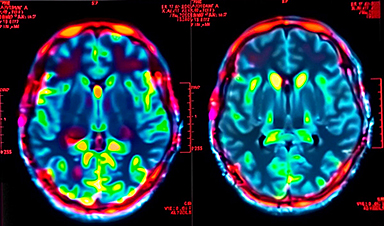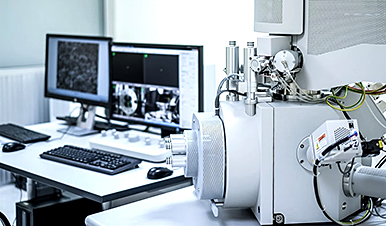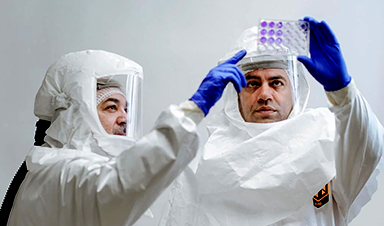Covid-19 vaccines are incredibly good at preventing severe symptoms and hospitalization, but they’re probably less effective at stopping transmission. To do that, we might need a different kind of vaccine altogether.
Because SARS-CoV-2 is mainly transmitted through droplets and airborne aerosols, some scientists reason that a vaccine should provide first-line protection where the virus typically enters the body — the nose. A Covid-19 vaccine that’s sprayed into the nose may not only prevent people from getting sick in the first place but also stop them from spreading the virus to others.
“When you get Covid-19, you don’t get injected with the virus. You get it in your respiratory tract,” Matt Memoli, MD, a virologist at the National Institute of Allergy and Infectious Diseases, tells the Coronavirus Blog. “So, you don’t need antibodies in the blood to prevent infection there. You need antibodies at the site of infection at the mucus membranes, at the airways.”
All vaccines are designed to spur the production of protective immune proteins called antibodies. Most vaccines are injected into the muscle, which stimulates serum antibodies that circulate in the blood. Serum antibodies are generally very effective at protecting against serious disease.
A nasal spray vaccine, on the other hand, generates antibodies that are secreted by the tissue that lines the inside of the nose. Antibodies here can block the incoming pathogen at the site of infection. This type of immunity is known as mucosal immunity. FluMist, a nasal spray vaccine for flu, works this way.
Without protective antibodies in the nose, those who get an injected Covid-19 can harbor viral particles there even if they don’t have disease symptoms themselves. That means it’s still possible for people to pass on the virus even if they’re vaccinated.
The authorized Covid-19 vaccines by Moderna, Pfizer, and Johnson & Johnson aren’t designed to generate mucosal immunity, but there’s some indication that they do…
Image Credit: AP
Post by Amanda Scott, NA CEO. Follow her on twitter @tantriclens
Thanks to Heinz V. Hoenen. Follow him on twitter: @HeinzVHoenen
News
Does COVID increase the risk of Alzheimer’s disease?
Scientists discover that even mild COVID-19 can alter brain proteins linked to Alzheimer’s disease, potentially increasing dementia risk—raising urgent public health concerns. A recent study published in the journal Nature Medicine investigated whether both mild and [...]
New MRI Study Reveals How Cannabis Alters Brain Activity and Weakens Memory
A massive new study sheds light on how cannabis affects the brain, particularly during cognitive tasks. Researchers analyzed over 1,000 young adults and found that both heavy lifetime use and recent cannabis consumption significantly reduced brain [...]
How to Assess Nanotoxicity: Key Methods and Protocols
With their high surface area and enhanced physicochemical properties, nanomaterials play a critical role in drug delivery, consumer products, and environmental technologies. However, their nanoscale dimensions enable interactions with cellular components in complex and [...]
Nanotech drug delivery shows lasting benefits, reducing need for repeat surgeries
A nanotechnology-based drug delivery system developed at UVA Health to save patients from repeated surgeries has proved to have unexpectedly long-lasting benefits in lab tests – a promising sign for its potential to help human patients. [...]
Scientists Just Found DNA’s Building Blocks in Asteroid Bennu – Could This Explain Life’s Origins?
Japanese scientists detected all five nucleobases — building blocks of DNA and RNA — in samples returned from asteroid Bennu by NASA’s OSIRIS-REx mission. NASA’s OSIRIS-REx mission brought back 121.6 grams of asteroid Bennu, unveiling nitrogen-rich organic matter, including DNA’s essential [...]
AI-Designed Proteins – Unlike Any Found in Nature – Revolutionize Snakebite Treatment
Scientists have pioneered a groundbreaking method to combat snake venom using newly designed proteins, offering hope for more effective, accessible, and affordable antivenom solutions. By utilizing advanced computational techniques and deep learning, this innovative [...]
New nanosystem offers hope for improved diagnosis and treatment of tongue cancer
A pioneering study has unveiled the Au-HN-1 nanosystem, a cutting-edge approach that promises to transform the diagnosis and treatment of tongue squamous cell carcinoma (TSCC). By harnessing gold nanoparticles coupled with the HN-1 peptide, [...]
Global Trust in Science Is Stronger Than Expected – What’s Next?
A landmark global survey conducted across 68 countries has found that public trust in scientists remains robust, with significant support for their active involvement in societal and political matters. The study highlights the public’s [...]
Microplastics in the bloodstream may pose hidden risks to brain health
In a recent study published in the journal Science Advances, researchers investigated the impact of microplastics on blood flow and neurobehavioral functions in mice. Using advanced imaging techniques, they observed that microplastics obstruct cerebral blood [...]
AI Surveillance: New Study Exposes Hidden Risks to Your Privacy
A new mathematical model enhances the evaluation of AI identification risks, offering a scalable solution to balance technological benefits with privacy protection. AI tools are increasingly used to track and monitor people both online [...]
Permafrost Thaw: Unleashing Ancient Pathogens and Greenhouse Gases
Permafrost is a fascinating yet alarming natural phenomenon. It refers to ground that remains frozen for at least two consecutive years. Mostly found in polar regions like Siberia, Alaska, and Canada, permafrost plays a [...]
Frequent social media use tied to higher levels of irritability
A survey led by researchers from the Center for Quantitative Health at Massachusetts General Hospital and Harvard Medical School has analyzed the association between self-reported social media use and irritability among US adults. Frequent [...]
Australian oysters’ blood could hold key to fighting drug-resistant superbugs
Protein found in Sydney rock oysters’ haemolymph can kill bacteria and boost some antibiotics’ effectiveness, scientists discover An antimicrobial protein found in the blood of an Australian oyster could help in the fight against [...]
First U.S. H5N1 Death Sparks Urgency: Scientists Warn Bird Flu Is Mutating Faster Than Expected
A human strain of H5N1 bird flu isolated in Texas shows mutations enabling better replication in human cells and causing more severe disease in mice compared to a bovine strain. While the virus isn’t [...]
AI Breakthrough in Nanotechnology Shatters Limits of Precision
At TU Graz, a pioneering research group is leveraging artificial intelligence to drastically enhance the way nanostructures are constructed. They aim to develop a self-learning AI system that can autonomously position molecules with unprecedented precision, potentially [...]
How Missing Sleep Lets Bad Memories Haunt Your Mind
Research reveals that a lack of sleep can hinder the brain’s ability to suppress unwanted memories and intrusive thoughts, emphasizing the importance of restful sleep for mental health. Sleep deprivation has been found to [...]






















